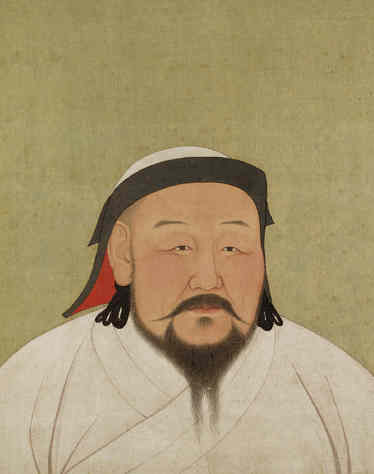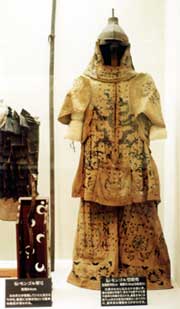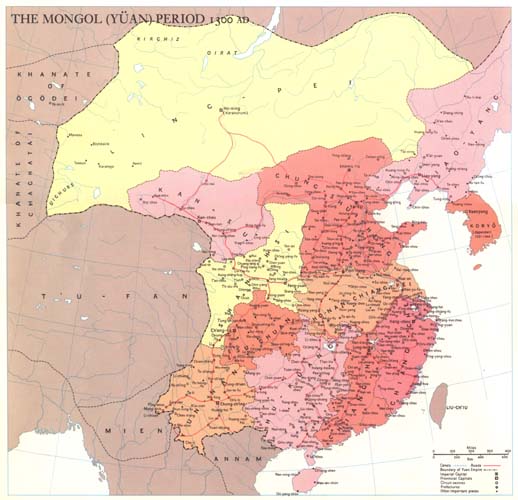In 1259, the Mongol Great Khan Mongke died in Sichuan. Khubilai declared himself the Great Khan, and after defeating Arigh Boke, his brother, in battles during the years 1260-64 was effectively so. Then in 1272, he declared the founding of the Da Yuan, the Great Yuan, and claimed the Mandate of Heaven as Emperor of China. Even before the proclaimation, Khubilai's forces had already made their move against the sole surviving state in metropolitan China, the great Southern Song dynasty, with its capital at Linan (modern Hangzhou).
The Southern Song capital was a city of art and culture, learning and scholarship, and possessing great wealth. It was the largest and wealthiest city in the world. Travellers from Europe, like Marco Polo, commented on it being the greatest city, unlike any other on earth, even though they had only seen it after the fall of the Southern Song dynasty and when all Chinese observors agreed it was not what it once was. Such a rich target was a natural objective for the man who claimed to rule all China.
The Mongol invasion was planned differently from all others. Instead of the traditional route directly across the Huai river in E China, the Mongols chose to sweep down the Yangzi from the West. And it would involve the use of inland navies and sophisticated seige equipment and rely heavily on the use of Chinese foot soldiers, sailors and military specialists. Khubilai spent years acquiring intelligence, assembling specialists and building up supplies for this campaign.
First, the Mongols had to take the twin cities of Fancheng and Xiangyang on the Han river in northern Hubei, which guarded that approach into Song territory. The seige of these two cities was an epic for both the Chinese and the Mongols, full of heroism and deeds especially for the Song Chinese defenders.
Despite the weak emperor and political weakness of the Southern Song towards its end, it was still militarily powerful with a number of dedicated and loyal military leaders willing to fight to defend it. The ordinary people also showed more willingness to resist, than the moribund Imperial Court, with most of the elite Confucian scholar-officials refusing to serve the Yuan for decades after the end of the dynasty.
Khubilai chose Aju, son of Uriyangkhadai who had served as his chief of staff during the Dali campaigns in Yunnan in 1253-54, as commanding general of the Mongol forces. Aju was a great general who had served spectacularly as a tumen commander during said campaign, and represented the best of Mongol military traditions. He was also the grandson of Subotei, that great Mongol general who served so ably in the western campaigns.
Aju led the Mongol forces out in 1267 and surveyed the strong Chinese bastion. Deciding on seige tactics, he would have to blockade the twin cities by land and water, prevent their communications across the river separating them and cut off supplies and reinforcements coming from downriver. It was impossible with the nearly completely Mongol force at his disposal. He requested for the aid of Chinese forces under the command of Shi Shu, a loyal Khubilai vassal, in 1268.
When the Chinese reinforcements arrived, they began to capture enemy boats, and building their own, as well as imitating Song naval tactics, in order to match the Song inland navy. This was to prove the critical phase of the entire Mongol campaign, and would be used throughout its entirety.
Even so, it wasn't until February 1273 that the twin cities of Fancheng and Xiangyang fell, amply demonstrating that the will to fight was not lacking amongst the Song Chinese. Fancheng was the first to fall, aided with the use of hui-hui pao or 'Muslim trebuchets', an introduced and better version of catapults that those available locally that could throw heavy projectiles against walls and gates as well as gunpowder-filled explosive charges. Xiangyang surrendered soon after.
The invasion didn't continue until in late 1274. Bayan was called in to command all the Mongol forces. He was a trusted Mongol statesman and general, who had served in the Secretarial Council for a full 5 years before being assigned with this military command. The Mongols immediately marched.
A diversionary force was sent overland to the southeast across Anhui. Meanwhile, Bayan himself led the main 200000-strong army, consisting mainly of Chinese foot soldiers and including an elite corps of Mongol cavalrymen and also the Yuan inland navy. It was said to be the largest ever single army fielded by the Mongols, although still outnumbered by the Song Chinese military.
Bayan led the army down the Han river, won all the battles along the way and entered the Yangzi in early 1275. The Song defenders were mostly induced to surrender by sending turncoat generals ahead to persuade them to switch sides. Many did, but many didn't. The Mongols never hesitated to fight when necessary, especially against the formidable Song inland navy massed on the Yangzi.
In March 1275, the Song chief minister, Jia Sidao, was forced by public opinion to lead a 130000-strong Song army into the Central Yangzi to join other Song forces already there to oppose the Mongol invaders. He was supported by the Song inland navy fleet with its 2500 ships blockading the Yangzi. The opposing forces met in Anhui in the middle Yangzi region.
Bayan sent out the Mongol cavalry to attack the Song forces on both banks of the river and bombarded the Song fleet with his catapults. Jia Sidao and the Song generals fled in disorder. The Imperial Court panicked, with the Dowager Empress removing Jia from office. He was later executed by local officials acting of their own accord. The Song tried to negotiate a peace with the Mongols, but with Mongols setting out for total victory, peace was not possible.
The Imperial Court panicked, with the Dowager Empress removing Jia from office. He was later executed by local officials acting of their own accord. The Song tried to negotiate a peace with the Mongols, but with Mongols setting out for total victory, peace was not possible.
Bayan reached Jiankang (modern Nanjing) in August 1275, whereby he paused to organise a civilian administration to restore order in the newly conquered territories. This was the clearest evidence yet of how far the Mongols had come, in their development as an imperial power setting out to rule an empire, compared with the first Mongol incursions into N China 60 years earlier.
When Bayan resumed the march towards Linan, he was recalled to court for consultations with Khubilai, for Khaidu had led a rebellion against Khubilai in the north-western reaches of Khubilai's realm since 1268. He returned to the army in November.
The final phase of the conquest went smoothly, despite fierce resistance in several of the lower Yangzi cities. Bayan and his troops had to fight a few major battles, including one at Changzhou where a loyal Chinese garrison stubbornly held out in December. The city was stormed, and the garrison and entire civilian population was put to the sword. This would be the last major military engagement of the invasion, and one of at least two occasions when Bayan ignored Khubilai's orders to act like Cao Bin (who had conquered Nanjing for the Song at the end of the 10th century without killing a single person).
The fall of Linan (Hangzhou) two months later was bloodless, and Bayan even took the time to work out a formal surrender treaty with the captured Song Imperial Court. The Mongols entered the city on 10 February 1276. Power and the Mandate of Heaven was formally transferred to the Yuan dynasty, along with the Imperial Seal, the same one used by Qin Shihuangdi the First Emperor. The Song ex-imperial family was sent to live in Dadu (Beijing), the Yuan capital.
Nevertheless Chinese resistance lasted for some more years. Song loyalists organised themselves around a propped-up boy emperor, brother to the last formal Song emperor. The final confrontation took place off the water of modern Hong Kong in 1279, where the Mongol army had forced the Song out into the sea onto Song warships.
With the Mongols closing in fast, a venerated official of the Song took the poor boy emperor on his back and jumped into the sea to commit suicide , rather than be captured by the enemy. Thus, the venerated and most popular of all the Chinese dynasties came to an end, and the Mongol Yuan would rule China, for a little while.
, rather than be captured by the enemy. Thus, the venerated and most popular of all the Chinese dynasties came to an end, and the Mongol Yuan would rule China, for a little while.
The Southern Song capital was a city of art and culture, learning and scholarship, and possessing great wealth. It was the largest and wealthiest city in the world. Travellers from Europe, like Marco Polo, commented on it being the greatest city, unlike any other on earth, even though they had only seen it after the fall of the Southern Song dynasty and when all Chinese observors agreed it was not what it once was. Such a rich target was a natural objective for the man who claimed to rule all China.
The Mongol invasion was planned differently from all others. Instead of the traditional route directly across the Huai river in E China, the Mongols chose to sweep down the Yangzi from the West. And it would involve the use of inland navies and sophisticated seige equipment and rely heavily on the use of Chinese foot soldiers, sailors and military specialists. Khubilai spent years acquiring intelligence, assembling specialists and building up supplies for this campaign.
First, the Mongols had to take the twin cities of Fancheng and Xiangyang on the Han river in northern Hubei, which guarded that approach into Song territory. The seige of these two cities was an epic for both the Chinese and the Mongols, full of heroism and deeds especially for the Song Chinese defenders.
Despite the weak emperor and political weakness of the Southern Song towards its end, it was still militarily powerful with a number of dedicated and loyal military leaders willing to fight to defend it. The ordinary people also showed more willingness to resist, than the moribund Imperial Court, with most of the elite Confucian scholar-officials refusing to serve the Yuan for decades after the end of the dynasty.
Khubilai chose Aju, son of Uriyangkhadai who had served as his chief of staff during the Dali campaigns in Yunnan in 1253-54, as commanding general of the Mongol forces. Aju was a great general who had served spectacularly as a tumen commander during said campaign, and represented the best of Mongol military traditions. He was also the grandson of Subotei, that great Mongol general who served so ably in the western campaigns.
Aju led the Mongol forces out in 1267 and surveyed the strong Chinese bastion. Deciding on seige tactics, he would have to blockade the twin cities by land and water, prevent their communications across the river separating them and cut off supplies and reinforcements coming from downriver. It was impossible with the nearly completely Mongol force at his disposal. He requested for the aid of Chinese forces under the command of Shi Shu, a loyal Khubilai vassal, in 1268.
When the Chinese reinforcements arrived, they began to capture enemy boats, and building their own, as well as imitating Song naval tactics, in order to match the Song inland navy. This was to prove the critical phase of the entire Mongol campaign, and would be used throughout its entirety.
Even so, it wasn't until February 1273 that the twin cities of Fancheng and Xiangyang fell, amply demonstrating that the will to fight was not lacking amongst the Song Chinese. Fancheng was the first to fall, aided with the use of hui-hui pao or 'Muslim trebuchets', an introduced and better version of catapults that those available locally that could throw heavy projectiles against walls and gates as well as gunpowder-filled explosive charges. Xiangyang surrendered soon after.
The invasion didn't continue until in late 1274. Bayan was called in to command all the Mongol forces. He was a trusted Mongol statesman and general, who had served in the Secretarial Council for a full 5 years before being assigned with this military command. The Mongols immediately marched.
A diversionary force was sent overland to the southeast across Anhui. Meanwhile, Bayan himself led the main 200000-strong army, consisting mainly of Chinese foot soldiers and including an elite corps of Mongol cavalrymen and also the Yuan inland navy. It was said to be the largest ever single army fielded by the Mongols, although still outnumbered by the Song Chinese military.
Bayan led the army down the Han river, won all the battles along the way and entered the Yangzi in early 1275. The Song defenders were mostly induced to surrender by sending turncoat generals ahead to persuade them to switch sides. Many did, but many didn't. The Mongols never hesitated to fight when necessary, especially against the formidable Song inland navy massed on the Yangzi.
In March 1275, the Song chief minister, Jia Sidao, was forced by public opinion to lead a 130000-strong Song army into the Central Yangzi to join other Song forces already there to oppose the Mongol invaders. He was supported by the Song inland navy fleet with its 2500 ships blockading the Yangzi. The opposing forces met in Anhui in the middle Yangzi region.
Bayan sent out the Mongol cavalry to attack the Song forces on both banks of the river and bombarded the Song fleet with his catapults. Jia Sidao and the Song generals fled in disorder.
 The Imperial Court panicked, with the Dowager Empress removing Jia from office. He was later executed by local officials acting of their own accord. The Song tried to negotiate a peace with the Mongols, but with Mongols setting out for total victory, peace was not possible.
The Imperial Court panicked, with the Dowager Empress removing Jia from office. He was later executed by local officials acting of their own accord. The Song tried to negotiate a peace with the Mongols, but with Mongols setting out for total victory, peace was not possible. Bayan reached Jiankang (modern Nanjing) in August 1275, whereby he paused to organise a civilian administration to restore order in the newly conquered territories. This was the clearest evidence yet of how far the Mongols had come, in their development as an imperial power setting out to rule an empire, compared with the first Mongol incursions into N China 60 years earlier.
When Bayan resumed the march towards Linan, he was recalled to court for consultations with Khubilai, for Khaidu had led a rebellion against Khubilai in the north-western reaches of Khubilai's realm since 1268. He returned to the army in November.
The final phase of the conquest went smoothly, despite fierce resistance in several of the lower Yangzi cities. Bayan and his troops had to fight a few major battles, including one at Changzhou where a loyal Chinese garrison stubbornly held out in December. The city was stormed, and the garrison and entire civilian population was put to the sword. This would be the last major military engagement of the invasion, and one of at least two occasions when Bayan ignored Khubilai's orders to act like Cao Bin (who had conquered Nanjing for the Song at the end of the 10th century without killing a single person).
The fall of Linan (Hangzhou) two months later was bloodless, and Bayan even took the time to work out a formal surrender treaty with the captured Song Imperial Court. The Mongols entered the city on 10 February 1276. Power and the Mandate of Heaven was formally transferred to the Yuan dynasty, along with the Imperial Seal, the same one used by Qin Shihuangdi the First Emperor. The Song ex-imperial family was sent to live in Dadu (Beijing), the Yuan capital.
Nevertheless Chinese resistance lasted for some more years. Song loyalists organised themselves around a propped-up boy emperor, brother to the last formal Song emperor. The final confrontation took place off the water of modern Hong Kong in 1279, where the Mongol army had forced the Song out into the sea onto Song warships.
With the Mongols closing in fast, a venerated official of the Song took the poor boy emperor on his back and jumped into the sea to commit suicide
 , rather than be captured by the enemy. Thus, the venerated and most popular of all the Chinese dynasties came to an end, and the Mongol Yuan would rule China, for a little while.
, rather than be captured by the enemy. Thus, the venerated and most popular of all the Chinese dynasties came to an end, and the Mongol Yuan would rule China, for a little while.


